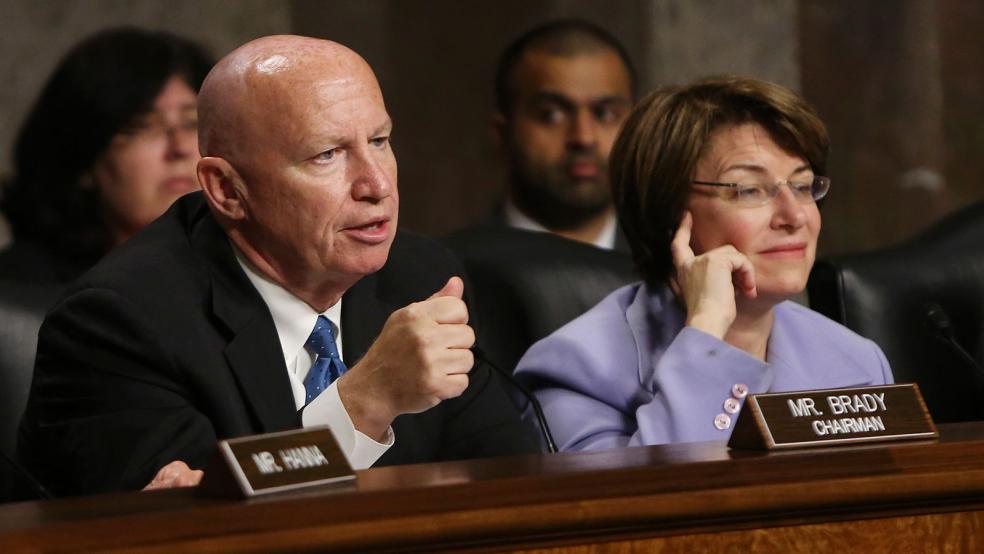Rep. Kevin Brady (R-TX), the new chair of the powerful tax-writing House Ways and Means Committee, has visions of replicating the deep, Reagan-era tax cuts for businesses and individuals. He plans to tap into huge piles of corporate income currently being stashed overseas and renew GOP efforts to overhaul Medicare for health care providers as well as beneficiaries.
The free market conservative who was tapped by Speaker Paul Ryan of Wisconsin and other House Republican leaders last week to succeed Ryan as the new committee chief, is wasting little time mapping out a new GOP strategy for tax and entitlement reform, as his party seeks a separation agreement from President Obama’s fiscal and tax policies.
Related: Free Market Conservative Kevin Brady Takes Over Ways and Means
The 60-year-old veteran lawmaker and one-time Texas chamber of commerce official told Roll Call that he planned to pursue tax reform every week until a “built-for-growth” tax code was established. He said he wants to prepare for a “Reagan-style reform.”
Brady, of course, shouldn’t be taken too literally in his ambitions to match the Gipper in achieving tax reform, although there are some similarities to the two approaches. The Economic Recovery Tax Act of 1981 enacted during the first year of Reagan’s administration sought to spark economic growth through sharp cuts in individual and corporate tax rates, reduction in the estate tax, new incentives for small businesses, the expensing of depreciable property and other incentives to encourage investment and savings.
The 60-year-old Texas lawmaker has long-championed the need to simplify the federal tax code, reduce taxes on corporations and businesses, improve expense write-offs and rewrite so called territorial tax measures to encourage multinational corporations to pay taxes on billions of dollars of income currently being kept in overseas tax havens.
Related: Smart Tax Reform Has to Account for This Massive Change
While Ryan, Senate Finance Committee Chair Orrin G. Hatch (R-UT) and the next president will have much to say about the ultimate shape of any tax reform measure, Brady’s wish list includes the following:
- A major reduction in the top individual and corporate tax rates. Currently, the top individual tax rate is 39.6 percent and the top corporate tax rate is 35 percent. Brady signaled that the corporate tax rate must come down to less than 20 percent for businesses and something similar for individuals.
- New “territorial tax reform” that potentially would reduce rates on $2.1 trillion of offshore corporate earnings that are currently out of the reach of the Internal Revenue Service. Republicans and the Obama administration have both floated ideas for a one-time amnesty on multi-national corporations’ offshore holdings to persuade them to pay hundreds of billions of dollars in back taxes without incurring onerous penalties.
- Additional changes in the way Medicare reimburses doctors and other health care providers to encourage government savings and greater efficiencies. Congress in April approved bipartisan legislation to prevent a 21 percent cut in payments to doctors who treat Medicare patients and created a new formula to assure hospitals and physicians receive adequate reimbursement.
Related: Paul Ryan Flexes His Conservative Muscles in Contrast to Boehner
Beyond that, Brady says he would be eager to explore ways to expand private health plans within the Medicare program, including legislative language to allow seniors to set aside a set amount of money to purchase coverage. Under the current Medicare Advantage plan, private companies contract with Medicare to provide full hospital, physician and outpatient services.
Some short-term measures. Brady and Ryan may be open to attaching permanent extensions of some business tax breaks such as the research and experimentation credit to the new highway and infrastructure bill working its way through Congress this fall.
“I would say he’s a pretty solid free market conservative, and his attitudes on tax policy I think would track extremely closely to Paul Ryan’s,” Scott Hodge, president of the non-partisan Tax Foundation, told The Fiscal Times last week. “His work on the Joint Economic Committee I think tends to illustrate that he would favor simplifying the tax system. He would be in favor of reducing taxes on corporations, on capital. Basically, business tax reform would be a key priority.”





